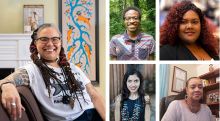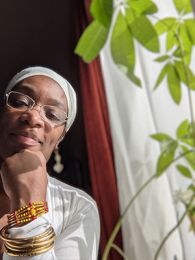 Introduction to Part I of the Special Issue
Introduction to Part I of the Special IssueJesica Siham Fernández, Geraldine (Geri) Palmer, & Dominique Thomas
The jaws of colonial power -- as well as colonialism and coloniality that manifest as anti-Black racism, nativism, and intersecting forms of oppression implicated in racialized violence -- must be disrupted and dismantled!
Read more... Resisting the Coloniality and Colonialism of a Westernized Community Psychology: Toward a Critical Racial Justice Praxis
Resisting the Coloniality and Colonialism of a Westernized Community Psychology: Toward a Critical Racial Justice PraxisAnn Marie Beals, Dominique Thomas, Jesica Siham Fernández, Ciann L. Wilson, & Geraldine Palmer
The institutional violence we are now experiencing, coupled with historical and ongoing waves of oppression, is a result and continuation of the legacy of colonialism. The outward eruptions that we are seeing over the last years are a result of American and Canadian settler nation-states that have taken hold in North America but are now in decline. Yet, the perpetuation of imperialism and white supremacist ideologies via the academe and other noneducational entities reproduced through curricula, pedagogy, and institutional policies and practices must still be addressed. What can we do? We, the authors of this paper, are troubled by this question and respond with a question of our own: Can community psychology really be part of the solution if it does not acknowledge that it is part of the problem?
Read more... Here to Stay: How we Created a Movement Toward Decolonizing our High School
Here to Stay: How we Created a Movement Toward Decolonizing our High SchoolJanelle M. Silva & Las Gatas
A praxis and pedagogy, decoloniality can play a critical role in students’ understanding of systems of oppression and their role in creating systemic change. As decoloniality emphasizes the importance of undoing and unlearning, it is critical that a decolonial pedagogy (Buttaro, 2010; Lissovoy, 2010) provide students an opportunity to engage in these actions. Using autoethnography (Anzaldúa, 2002), the paper discusses the process that a group of Latinx high school students went through to create “Soy Yo” and draw upon decolonial theory to analyze how learning about decoloniality and YPAR led them to begin the process of decolonizing their school.
Read more... Colour Between the Lines: Self-determination and the Creation of Settings as Resistance to Structural Violence
Colour Between the Lines: Self-determination and the Creation of Settings as Resistance to Structural ViolenceRama Agung-Igusti, Christopher C. Sonn, Anyuop Dau, Ez Eldin Deng, Ruth Nyaruot Ruach, Geskeva Komba, & Nyakeer Akoul
For many people from communities of the African diaspora in Australia, raced-based discrimination through mechanisms of structural violence frames day to day lived experiences. Yet, while racialised and other forms of structural violence pervade the lives of black people and other marginalised groups, individuals and communities also resist and survive every day. We describe the emergence of Colour Between the Lines as an enactment of racial justice through the self-determined activity that has emerged from a group of people who individually and collectively continue to be subjected to racialised structural violence.
Read more... Creating Change Agents: Teaching HBCU Undergraduates to Use Community-Based Research to Resist Racism
Creating Change Agents: Teaching HBCU Undergraduates to Use Community-Based Research to Resist RacismLeslie V. Collins, LaTia Glasgow, Emily Tyra, Stephanie Wade, Makayla Summerow, & MyKaila Jones
The rise of a “colorblind” vernacular among young adults’ limits how they understand race and racism in ways that allow white supremacists ideologies to thrive. . Liberatory research methodologies offer opportunities for young adults, specifically undergraduates at Historically Black Colleges and Universities (HBCU) to catalyze and expand their efforts for community change and social justice. This descriptive study explores the process of using problem-based learning to teach undergraduates liberatory methodology and qualitative research methods to affect community change and social justice.
Read more... What We Not Finna Do: Respectfully Collaborating with Skinfolk and Kinfolk in Black Feminist Participatory Action Research
What We Not Finna Do: Respectfully Collaborating with Skinfolk and Kinfolk in Black Feminist Participatory Action Research
Monique A. Guishard, Devin A. Heyward, Justin T. Brown, & Marcia Stoddard-Pennant
In this article, we (Black community social psychologists and community organizers) with over 40 years of collaborative research experience, share the successes and challenges of using Black Feminist Participatory Action Research to actualize The Community Engaged Research Academy (CERA). CERA was a two-year multi-method project (community dialogues, focus groups, surveys, PhotoVoice, body mapping, and space mapping) aimed at teaching Bronx patients the language and ethics of research. We share our confrontations with ways of being we had to leave behind and adopt to accomplish the CERA project. Some of the lessons we learned included centering Black community psychology, embracing critical race praxis, naming sacred moments that were excluded from the purview of research, and honoring the complex stories Black patients shared with us with hermeneutics of love.
Read more... A Photovoice Project for Ethnic Health Justice: Reflections from Roma Communities in Seville, SpainA Photovoice Project for Ethnic Health Justice: Reflections from Roma Communities in Seville, Spain
A Photovoice Project for Ethnic Health Justice: Reflections from Roma Communities in Seville, SpainA Photovoice Project for Ethnic Health Justice: Reflections from Roma Communities in Seville, SpainDaniela E. Miranda, Lilyana Zhelyazkova, & Jana Sladkova
Roma are Europe’s largest ethnic minority and despite their national citizen status, 80% live in extreme poverty and have a much worse health status than their non-Roma counterparts. European institutions have identified the institutional discrimination targeted at Roma communities—antigypsyism—as the underlying cause of the violation of their rights (European Union Agency for Fundamental Rights, 2018). Policies, practices and societal attitudes contribute to maintaining the status quo. The project aimed at developing advocacy processes in three at-risk, predominantly Roma neighborhoods to ensure the implementation and evaluation of Roma health policies through participatory action research (PAR). Here we focus on the potential of Photovoice to serve as a liberating process to resist antigypsyism.
Read more... Politicized Healing: Addressing the Impact of State-Sponsored Violence
Politicized Healing: Addressing the Impact of State-Sponsored ViolenceTroy Harden and Elizabeth Deligio
This paper explores the concept of politicized healing as a method to address racialized trauma, providing a case study and discussing the impact of race-based police violence and key aspects of the model, including how this can be supported for individuals and communities impacted by other forms of state-sponsored violence and oppression.
Read more... Passing the Torch: The Communal Roots Of Intergenerational Messaging
Passing the Torch: The Communal Roots Of Intergenerational MessagingDeidra Somerville
Intergenerational messaging has been shown in previous studies to play a pivotal role in providing continuity to knowledge generation in Black life, particularly as related to passing essential knowledge of cultural, social, spiritual and practice. An examination of the ways Black maternal activists perceive intergenerational messaging as supporting their work as organizers is still in question. This study fills this gap by examining the forces that keep the hands of Black maternal activists steady as they guide the threads of activism for the next generation of liberators.
Read more...It is with incredible joy and pride that we present the first volume of this special issue on anti-racist practice.